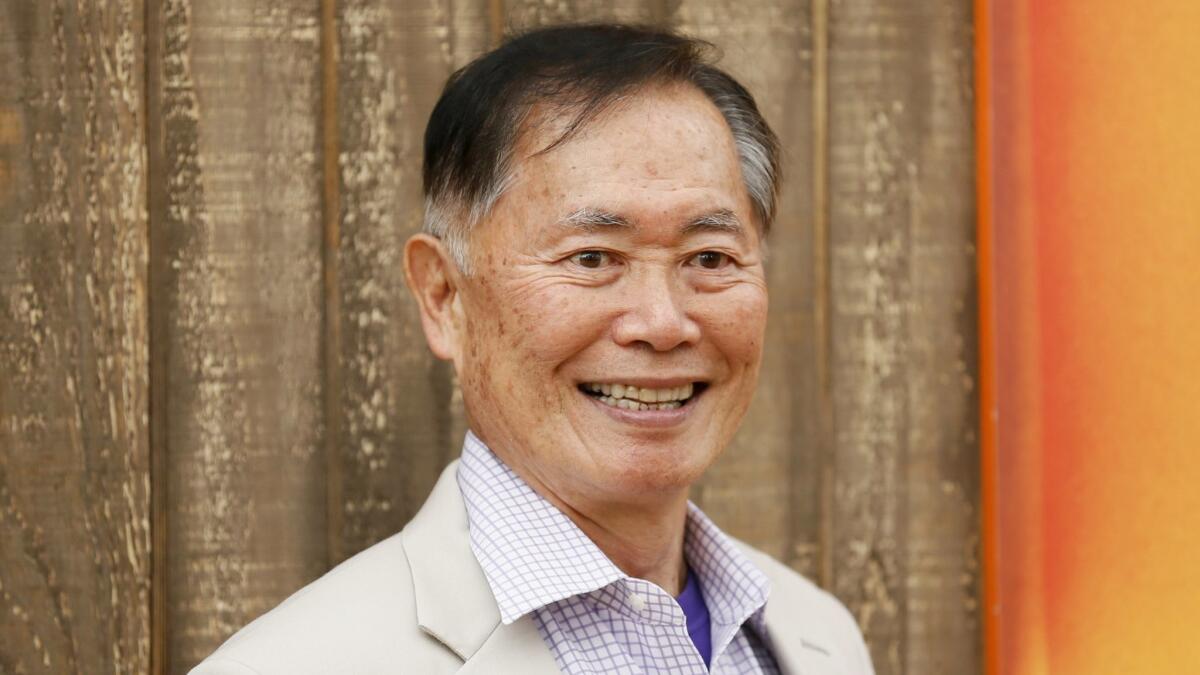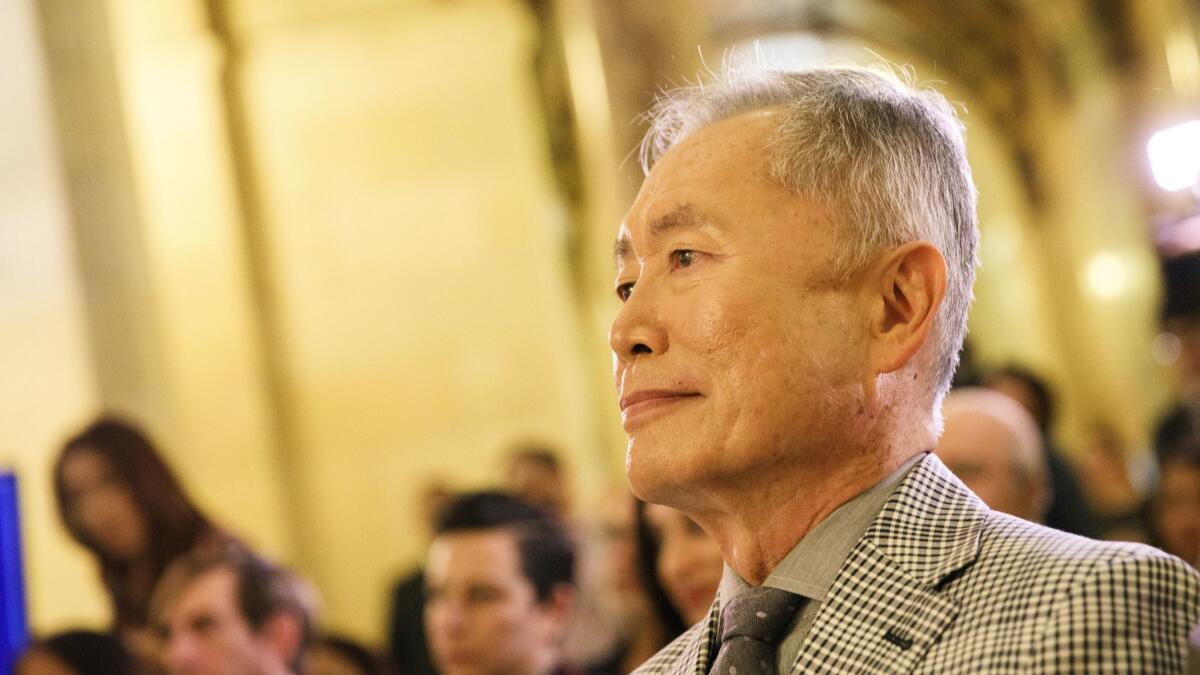Actor-activist George Takei riffs on Facebook fame, gay rights, and all things Donald Trump

He turned 81 on Friday, but life is much like it’s always been for actor-activist George Takei: busy, busy, busy.
Takei recently starred in the Los Angeles production of “Allegiance,” a musical inspired by the years that he spent in a Japanese-American internment camp during World War II.
He’s also doing public lectures, including one scheduled for UC San Diego on April 26th. And Takei runs a hugely popular Facebook page that features a mix of stories that spotlight everything from gay rights to human achievement to politics, fashion and cats. He also is a regular critic of President Trump.
His Facebook site has about 10 million followers, which has added to the celebrity of a man known worldwide for his portrayal of Sulu in “Star Trek.”
Takei (pronounced ta-kay) recently spoke to the Union-Tribune by phone and email. His remarks, which focus on social media and social justice, have been blended and lightly edited for space and clarity.
Q: Many people associate you with the future because you have appeared in films and television programs based in the future. It made me wonder whether you’re the type of person who projects ahead, who tries to figure out where we might be going technologically, and what that means. Are you?
A: Technology is wonderful. But it is man-made and we’re discovering some aspects that are not so wonderful because we are fallible. That’s the big issue right now in the political arena. Young, immature or vulnerable people are bullied. But that same technology, on a global scale, can change elections, can overthrow governments, can do drastic things. Ultimately it all comes back to the human condition, and human values.
Q: Facebook has been in the news so much, particularly for (co-founder Mark ) Zuckerberg appearing before the House and the Senate. Did you walk away with any different impression of the technology after you heard Zuckerberg speak?
A: I saw snippets on the news, so I didn’t hear his entire (testimony). I do think that we are going to have regulations, human restraints, put on the power of technology. Human beings have the potential for doing great things, but also the capacity for fallibility. We have to have a body of people with principles and morality to structure regulations so that they can guide the use of technology to minimize the harm that can be done.
Q: If you had the time to sit down with him, what would you talk about?
A: He’s a fascinating guy. He’s got ideas, he’s got energy, and I believe he has the ability to solve his company’s challenges …
But he is also a human being with all the fallibilities that humans have — a need to grow his business as big as it can get, the need to make profits beyond imagination, and the need to have power.

Q: Do you think it is possible for a user of Facebook to have some degree of privacy with their data, and allow Facebook to do what it wants in selling data? Can you have the best of both worlds? One for Facebook, one for those who use it?
A: I don’t think so. People like (Edward) Snowden have to go around regulations, and he’s paying the price for it being cut off from his country. Martin Luther King Jr. was willing to pay the price for breaking the law. He was a man of ideals and principles. The human being finds it so difficult in the battle between avarice and altruism.
Q: You’re a public figure.Your expectation of privacy isn’t what it might be for someone who isn’t famous. But, still, do you worry about the data that is collected about you on Facebook and --
A: And some of the data might be fake data.
Q: How does one even know, really?
A: Whether there is fake data about me out there?
Q: Now, how much of the data is real and how much is fake?
A: We don’t know. That’s the thing about technology. You don’t know some of the things that are happening.
Q: You have posted a lot of stories that were critical of President Trump. Are you worried about blowback?
A: I’ve been getting blowback. You have to go into this knowing (that would happen). But I think that’s the price for being actively engaged in social justice causes and, frankly, the political arena. It is a contest. There are people who want to win that contest — at all costs. Principles, humanity are trampled. You go into it knowing that that is the nature of the animal.
Q: Do you go into it thinking that any thing good is going to come from what you say to Mr. Trump?
A: That’s why I do it. I am trying to reach people who are going to react positively to what I say. I hope to galvanize them to be actively engaged in doing the right thing. I am a human being. I have fallibilities, too, and the arrogance to think I’m right and the guy in the White House is wrong.
Q: If you could speak to him —
A: And I have. I did the Celebrity Apprentice Show with Donald Trump … about six years ago, I believe.
During a press event promoting the show, I had been advocating for marriage equality (in New York). I said, “Mr. Trump, I’d like to invite you to have lunch with me at one of your restaurants. I will host. And we’ll discuss marriage equality.”
And I did that with the intent of getting him to make some comment on marriage equality. He had said he was opposed. I fully expected him to say, “I’m too busy. Can’t do it.”
But he surprised me. He said, “You know George that might be an interesting conversation. Have your people arrange with my people.” It took a long time, three or four months, but we got together for lunch.
I told him that you’re a business man and marriage equality in New York would be a profitable thing for you. People would love to come to New York to get married. They would stay in your hotels. They would eat in your restaurants. They might even get married in one of your banquet rooms. It would be good not only for you, but the economy.
He said, “Yeah, I agree with that. But I believe in traditional marriage.” That gave me pause because he’s famously been unfaithful. He was on his third marriage. But because I’m trying to win him over I restrained myself. I kept talking to him about why he would be opposed to something that would be beneficial to him financially and something that would be good for LGBT people. Give them security and a sense of comfort, safety, by having that legal protection for their partnership with someone they loved.
We kept going. He maintained that he was for traditional marriage and I didn’t think it was going to help my argument by saying, ‘Well, you obviously don’t believe in traditional marriage. So we had to leave it at that.”
Q: I realized how much things have changed a couple of nights ago. I was watching an Eddie Murphy concert from the 1980s and he was using a slur for gay people and the audience was roaring. If you used that word today people would take your head off.
A: That’s right. You try to live in the real world. You want to change that world. Sometimes, it’s going to take a long time.
I grew up in prison (internment camps), behind U.S. barbed wire fences, which was wrong. But at the time there was a hysteria that swept over this country and the president got stampeded. As a teenager I had many discussions with my father and recognized that needed to be changed. We needed to get an apology for that. That’s the best way for the nation to learn from a bad experience. It took more than 40 years, but we got the president of the United States, Ronald Reagan, to formally apologize, on behalf of the nation.
Q: What will you be talking about when you visit UC San Diego?
A: I will be talking, in essence, about the people’s democracy in the context of my childhood imprisonment and how that shaped me into who I am. I was five years old at the time. As I grew older and I couldn’t find information in history books about the internment, I had many conversations with my father, and got an understanding of American democracy.
As I grew older, I started to discover that I was different in ways other than just my Japanese face. That I was attracted to (males). And then as I grew older, I learned that there’s a name for it, gay. If I wanted to be an actor, I couldn’t be gay. So I started to act like everybody else. I dated, I went on double dates, I was living a double life, just so I could have a career doing what I passionately enjoyed.
Then, in a gay bar, I was told by one of the older guys that we have to be careful because the police would raid gay bars and march people out and take them to the police station and fingerprint them, photograph them, put their names on a list, which was devastating.
I certainly didn’t want to get criminalized like that so I when I went into a gay bar I looked for the exits and knew where I (would) go. And then I drew that parallel between my childhood imprisonment ... and guys (who were) doing nothing wrong, harming no one, being criminalized.
I’ll be talking about the core principles about American democracy.
Sign up for the Pacific Insider newsletter
You may occasionally receive promotional content from the Pacific San Diego.
